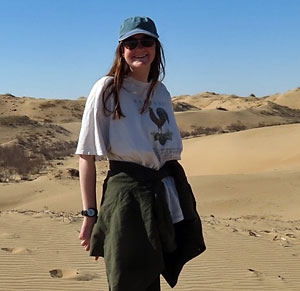2017 SIT Study Abroad Undergraduate Research Award Winners
August 11th, 2017 | SIT Study Abroad

SIT is pleased to announce the recipients of the 2017 SIT Study Abroad Undergraduate Research Award, Maya Sutton-Smith, of Connecticut College, and Lani Cupo, of Occidental College. Their Independent Study Projects, completed as part of their SIT Study Abroad programs, were chosen from over 2,000 projects. Both receive $150 and are nominated for the Forum on Education Abroad’s 2017 Award for Academic Achievement Abroad (winners announced in November).
Maya Sutton-Smith
Connecticut College
SIT Mongolia: Nomadism, Geopolitics, and the Environment
ISP: “Remembering Negdels: Nostalgia, Memory and Soviet-Era Herding Collectives”
Could you tell us about your research?
During the socialist period, Mongolia’s nomadic herders were grouped into collective herding units called negdels. Through oral history-style interviews with people about their memories of the socialist period and negdels in particular, I found that a significant trend of nostalgia exists among older generations of Mongolians. Nostalgia is a remembrance of the past but it is also a reflection on the present, so I saw the memories participants shared with me as a reflection of how they feel about Mongolia’s current economic and political situation.
How did you arrive at this subject for your research?
My research project was born out of a curiosity about how Mongolians remember the socialist
period, 27 years after the democratic transition. I chose to focus on negdels, the collective herding units, because they served as the foundation for almost every aspect of life during socialism. I thought asking people about negdels, a very concrete topic, would be a good way to get them talking about their more abstract memories of and feelings towards the socialist period.
Did you find out anything that you found particularly surprising?
I was actually surprised to discover just how much nostalgia existed for the socialist period in Mongolia. This forced me to reflect on the prejudices and preconceptions that I carry with me, and the importance of putting those biases aside to examine other narratives and the weight that they carry.
Could you tell us about your SIT Study Abroad experience?
Where do I begin? I am so grateful for the amazing and dedicated SIT staff in Mongolia who offered so much support throughout the semester – they have put so much work into making SIT Mongolia the incredible experience that it is. I am equally grateful for my wonderful host families, my inspiring and hilarious and supportive fellow students, and each one of the countless Mongolians who welcomed me into their country. Whether it was an interview, a bowl of tea, a meal, directions, or a place to stay, I was so thankful for all of the kindness and generosity I received. So I guess what I liked about my experience in a word — the people. And, of course, the country itself! Such a complex and breathtakingly beautiful place.
Lani Cupo
Occidental College
SIT Nepal: Tibetan and Himalayan Peoples
ISP: “Heretical science: deconstructing the false dichotomy of Buddhism and science”
Could you tell us about your research?
I traveled to Sera Jey Monastic University in Bylakuppe, India to take a critical look at the intersection of Tibetan Buddhism and Science (specifically neuroscience) through several lenses. First, I interviewed monks about philosophy of mind, or their beliefs about the separation (or lack thereof) of mind and brain. Second, I looked at how Tibetan language reflects these beliefs. Third, I observed a group of neuroscientists conducting an experiment at Sera Jey to help me understand how scientists and practitioners (often from different cultural backgrounds) are approaching one another as they work to understand each others' fields.
Summing up results is far more difficult. I coined a term to describe the relationship between mind and brain that Tibetan Buddhist philosophy seems to hold: “interdependent dualism,” meaning the mind and brain are distinct, but neither can really exist without the other. This distinction was indeed reflected in Tibetan language, even as it is in English.
How did you arrive at this subject for your research?
As a student of cognitive science, taking a semester away from my field of comfort provided both a refreshing break and a challenge. Each student in my program approached our classes focused around Tibetan language, culture, history, and politics from their own unique view point. For me, I couldn't help drawing on my past experience with philosophy and science as I learned about Buddhism. When we visited the Sera Jey Science Center on our first excursion, I could barely contain my excitement. While I had initially intended to study the changing culture around yaks as roads are built in remote Nepal, as soon as I heard the monks' response to my questions about the Big Bang, evolution, and abortion, I knew that's where I wanted to spend my month for independent research.
Did you find out anything that you found particularly surprising?
I was surprised by how fast the field of Contemplative Neuroscience is being accepted by scholars and researchers. Until recently studying mindfulness, meditation, or other contemplative practices was dismissed and scorned. In the past few years, however, there has been an increased interest from the scientific community internationally.
Could you tell us about your SIT Study Abroad experience?
I have nothing but positive feedback about my time with SIT in Nepal and India. While I could gush for paragraphs about the efficacy of drop-offs, homestays, and excursions, without a doubt the thing I value most about my experience was the connections I made. From my program directors to my homestay families, to my field work collaborators and fellow U.S. students, I could not be more honored to have had the opportunity to forge so many incredible friendships. So soon after my experience it is hard to map exactly how my semester shaped my life, but I have no doubt I will continue to discover the positive effects for years to come. Thank you for this incredible experience.
